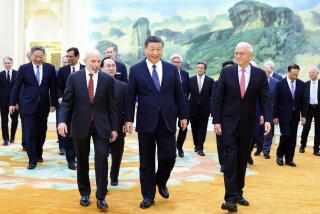As Talks End, Businessmen Cite Improving Relations : U.S.-Soviet Trade Hopes Improve
- Share via
MOSCOW — American business leaders ended a three-day conference on Soviet-American trade Wednesday with high hopes but only a few potential deals in sight.
Yet the Americans, and Soviet officials as well, said they were satisfied that a new start has been made on improving economic relations between the two superpowers.
“We had a very wonderful meeting here,” said Dwayne O. Andreas, chairman of Archer Daniels Midland Corp. and co-chairman of the U.S.-U.S.S.R. Trade and Economic Council.
Vladimir N. Sushkov, Soviet deputy minister of foreign trade, expressed similar optimism about future prospects, and he invited the American group to help put on an exhibition of U.S. engineering technology here next year.
The meeting, coming less than a month after Soviet leader Mikhail S. Gorbachev and President Reagan met at Geneva, was attended by a record 400 American business executives trying to take advantage of the warmer political climate.
Secretary of Commerce Malcolm Baldrige accompanied the group to Moscow to demonstrate Reagan’s personal interest in trade expansion.
Gorbachev entertained the group at a Kremlin banquet. Despite the new era of good feelings, he said the Soviet Union will demand most-favored-nation status and official credits before doing any large-scale business with American firms.
Status Has Been Denied
Most-favored-nation status means preferential trade terms and exemption from various tariffs. Moscow has been denied such status, and credits as well, under a law that links these advantages to increased emigration for Soviet Jews and others who want to leave the country.
Andreas said restrictions on Soviet-American trade have been exaggerated, but he nevertheless indicated that many big U.S. firms will try to get them removed “if the climate is right.”
“We are going to recommend dismantling the impediments to trade,” he said at a news conference. “I don’t expect miracles overnight . . . but I believe the impediments to trade will be dismantled as the attitude of both governments to each other improves.”
Sushkov, the deputy trade minister, said a new agreement had been signed here with Pepsico, worth at least $100 million, replacing an expiring agreement that carried a $70-million price tag.
Talks are continuing between the Soviet government and Caterpillar Tractor, he said, and they could result in another large contract.
Andreas said he is optimistic that American firms will be able to make agreements with the Soviets on oil exploration, perhaps within the next few months.
“There are great prospects,” he said, noting that new legislation will make American wheat more competitive in the world market and that the decline in the value of the dollar will reduce the price of U.S. industrial exports.
Sushkov, agreeing, said: “We are feeling a warm breeze from Geneva.”
More to Read
Inside the business of entertainment
The Wide Shot brings you news, analysis and insights on everything from streaming wars to production — and what it all means for the future.
You may occasionally receive promotional content from the Los Angeles Times.










